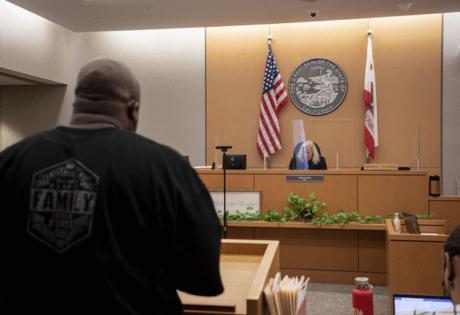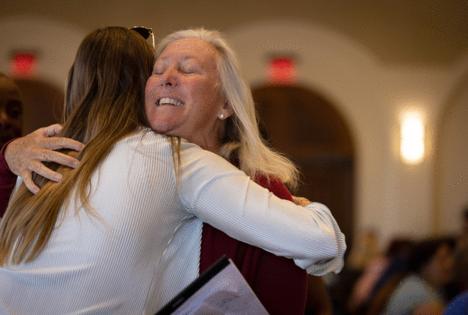'The structure I needed': Court for mentally ill defendants celebrates largest class of grads
Published in Lifestyles
SAN DIEGO — The man with a magnetic smile beamed as he stared down at the graduation certificate in his hands. It’s coming up on two years since the arrest that landed him in jail.
The arrest, it would turn out, gave him access to what he needed and helped him to earn this framed proof of fortitude.
“Before I got arrested, I was feeling helplessness, and I didn’t know where to get help,” Johannes McCoy said. “So I was really lost, and I ended up going down a bad path. In a way, I am kind of thankful that I went down that path, because I was able to get the help that I needed from this program.”
This week, McCoy became one of the latest to graduate Behavioral Health Court, a specialized San Diego Superior Court program offered to a fraction of felony criminal defendants who have a diagnosis of a serious mental illness — usually schizophrenia, schizoaffective disorder or bipolar disorder.
It’s a collaborative court, one in which prosecutors, defense attorneys, probation officers and treatment providers work together to craft specialized plans for each participant.
It’s a small program — roughly 100 spots — and a very intense one, providing participants with group housing, counseling and wrap-around support, including medication. It runs a minimum of 18 months, although several people need more time. This program offers a chance for participants to stabilize, gives them the tools to navigate life. Failure most likely means a trip back to jail, and for some, prison, to serve time for the crime that landed them here to begin with. Success wipes the conviction clean.
On Monday, McCoy and 25 others gathered to celebrate their completion of the very demanding offering.
The program, McCoy said, “gave me the structure that I needed. They gave me the guidance that I was looking for.”
This spring’s graduating class is the largest in the collaborative court’s 16-year history. When each of them started this program, they faced a felony charge. Now, they are pursuing education and securing jobs. One person is enrolled in an automobile repair program at a local community college, and another is working on a master’s degree at San Diego State University.
Despite its successes, Behavioral Health Court is under a cloud.
In recent months, the District Attorney’s Office has been at odds with Judge Cindy Davis, who oversees the program. Prosecutors, displeased with some of her decisions, are pushing Davis to recuse herself from mental health cases. She has refused, save for their first request, although the judge who inherited that case sided with Davis and handed the case back to her.
The ensuing tug-of-war has landed in a state appeals court.
With the behind-the-scenes legal battle, Behavioral Health Court has taken a body blow. No new defendants have been accepted into the program since December. Some 36 participants in the court program remain.
Monday’s celebration, at a luncheon at the University of San Diego, reflected none of that turmoil. Davis spoke to the crowd about the growth and successes of each graduate, highlighting their hard-won victories as they pushed through the requirements and challenges.
She knows each of the participants. Every month they must stand in her courtroom and talk with her, a hearing that serves as a check-in and a guardrail. That, Davis said, is where they “get to travel the journey together.”
“This is an example of what works,” Davis told the gathered audience of graduates and families. Behavioral Health Court is “transformative,” she said. “I see where we start and where we end up. I’m so proud of all of you, and so amazed at the transformations.”
Last month in court, two of the new graduates stood in Davis’ courtroom as she wiped from their records the charge that initially landed them there. Davis hugged them. One of them wore a nice suit and brought his mom.
On Monday, the judge told stories of individual graduates. One man had emerged as a cheerleader for others in his group home, she said. A woman had suffered an “incredible loss” during her time in the program but persevered.
She also read a statement from Deputy Public Defender Melissa Tralla, who is assigned to the court but was unable to attend Monday. Tralla praised the graduates’ perseverance as “extraordinary.”
“For those of us not personally afflicted by mental issues, we can only begin to understand your struggles,” Tralla wrote. “Through your monthly court hearings, you’ve shared experiences of hearing voices that urge you to do harmful things, seeing things that others don’t, battling drug addiction, facing the scars of physical and sexual abuse and numerous other traumatic lived experiences.
“I cannot imagine what you go through each day and how difficult this journey has been.”
Each graduate took the stage, and most thanked the team who helped them through, a small army of counselors and housing providers and probation officers and more. One graduate shared that he found help through group therapy and people who listen “when there’s the confusing parts of life that I don’t quite understand.”
At the tables, family members sat proudly next to graduates. One brought her children and grandchildren. In the back of the room, 31-year-old Gregory Sizemore sat with his sister, his mother and grandmother. He grinned down at his certificate. His grandmother quietly reached over, put her hand on his knee and smiled.
©2025 The San Diego Union-Tribune. Visit sandiegouniontribune.com. Distributed by Tribune Content Agency, LLC.



























Comments